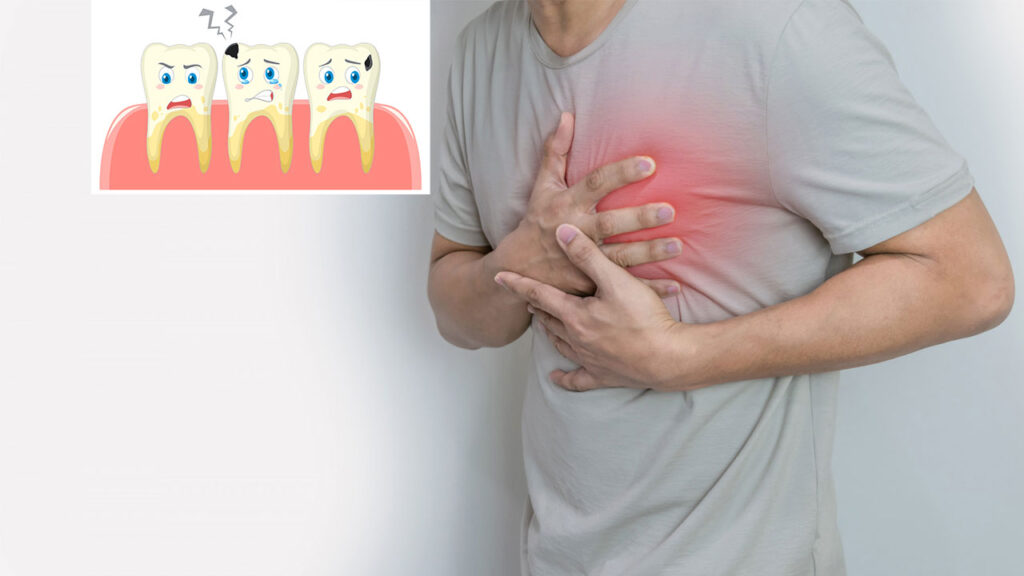Dental health is a crucial aspect of overall health and well-being. Good oral hygiene helps prevent cavities, gum disease, and tooth loss. Regular dental check-ups and cleanings can also detect and prevent more serious health issues.
Studies have shown a strong connection between oral health and heart disease. Poor oral hygiene can lead to gum disease, which can increase the risk of heart disease. Bacteria in the mouth can enter the bloodstream and cause inflammation, leading to the development of plaque and blockages in the arteries.
The purpose of this blog is to raise awareness of the connection between dental health and heart disease and to educate readers on the importance of maintaining good oral hygiene for overall health.
Understanding the Connection
A. How Oral Bacteria Affects Heart Health
Oral bacteria can enter the bloodstream through gum disease and cause inflammation in the blood vessels. This inflammation can lead to the formation of plaque, which can block the arteries and increase the risk of heart disease.
B. Risks of Gum Disease and Heart Disease

Gum disease has been linked to an increased risk of heart disease, stroke, and other cardiovascular issues. Those with gum disease are at a higher risk of developing heart disease, and those with heart disease are at a higher risk of developing gum disease.
C. Importance of Maintaining Good Oral Hygiene
Maintaining good oral hygiene is essential for preventing gum disease and reducing the risk of heart disease. Regular brushing, flossing, and dental check-ups can help keep the mouth healthy and free of harmful bacteria.
Symptoms and Risks of Gum Disease
A. Warning Signs of Gum Disease
The early warning signs of gum disease include red, swollen, or bleeding gums, persistent bad breath, and loose teeth. If these symptoms are not addressed, gum disease can progress and lead to more serious health issues.
B. Risks Associated with Gum Disease
Gum disease can lead to tooth loss and increase the risk of heart disease, stroke, and other cardiovascular issues. It can also affect overall health and well-being, causing chronic pain and discomfort.
C. Importance of Early Detection and Treatment
Early detection and treatment of gum disease are essential for preventing serious health issues. Regular dental check-ups and cleanings can help detect and treat gum disease before it becomes more serious.
How to Maintain Good Oral Hygiene
A. Brush and Floss Regularly
Brushing and flossing regularly are essential for maintaining good oral hygiene. Brushing should be done at least twice a day, and flossing should be done once a day.
B. Visit the Dentist Regularly
Visiting the dentist regularly for check-ups and cleanings is essential for maintaining good oral health. Regular dental visits can detect and prevent serious health issues, including gum disease and heart disease.
C. Eat a Healthy Diet
Eating a healthy diet that is low in sugar and high in fibre can help maintain good oral health. Foods that are good for the teeth include dairy products, fruits, and vegetables.
D. Quit Smoking and Limit Alcohol Consumption
Smoking and excessive alcohol consumption can harm oral health and increase the risk of gum disease and heart disease. Quitting smoking and limiting alcohol consumption can help maintain good oral hygiene and reduce the risk of serious health issues.
healthcareDental health is an important aspect of overall health and well-being. Take control of your dental health with our top-quality dental health care products. Say goodbye to painful and inconvenient dental issues and hello to a brighter, healthier smile.
These products are designed with the latest technology and are made from premium materials, ensuring that you get the best results. Whether you’re looking for a solution for sensitive teeth, gum health, or just want to keep your smile sparkling, our dental health care products have got you covered.
Tired of hiding your smile due to yellowing, stained, or sensitive teeth?
ProDentim is here to help. This advanced formula whitens and strengthens your teeth, while also reducing sensitivity and promoting oral health. Say goodbye to expensive and painful dental treatments, and start enjoying a bright, confident smile with ProDentim.
Click Here to Try ProDentim now and see the results for yourself!
Struggling with tooth sensitivity, gum problems or bad breath?
Dentitox Pro is the solution you need. This natural, effective formula helps to clean and strengthen your teeth and gums, giving you a brighter, healthier smile. Dentitox Pro is made with the finest ingredients and is free from harmful chemicals, making it safe and gentle for everyday use. Say goodbye to pain and embarrassment, and start enjoying a confident, beautiful smile with Dentitox Pro.
Click Here to Order now and get 20% off your first purchase!
Click Here for Professional Teeth Whitening
FAQ About the Dental Health and Heart Disease: Understanding the Connection
A. How Does Oral Bacteria Affect Heart Health?
Oral bacteria can enter the bloodstream through gum disease and cause inflammation in the blood vessels, leading to an increased risk of heart disease and stroke. This is because the bacteria can form clumps (plaques) in the blood vessels, reducing blood flow and increasing the risk of blockages. Maintaining good oral hygiene and regularly visiting the dentist can help reduce the risk of oral bacteria affecting heart health.
B. Can Gum Disease Be Reversed?
Yes, gum disease can be reversed in its early stages with proper treatment and good oral hygiene. Regular dental check-ups and cleanings, as well as brushing and flossing, can help prevent and treat gum disease.
C. How Does a Healthy Diet Help Maintain Good Oral Health?
A healthy diet that is low in sugar and high in fibre can help maintain good oral health. Eating foods that are good for the teeth, such as dairy products, fruits, and vegetables, can help strengthen the teeth and gums and prevent cavities and gum disease.
D. Does Smoking Affect Oral Health?
Yes, smoking can greatly harm oral health and increase the risk of gum disease and tooth loss. Quitting smoking can help improve oral health and reduce the risk of serious health issues.
In conclusion, dental health and heart health are closely connected. Maintaining good oral hygiene through regular brushing, flossing, and dental check-ups, as well as a healthy diet and quitting smoking, can help reduce the risk of gum disease and heart disease. Early detection and treatment of gum disease are crucial for maintaining overall health and well-being.
Taking care of oral health is critical for overall health and well-being. Good oral hygiene, regular dental check-ups and cleanings, a healthy diet, and avoiding smoking can help maintain good oral health and reduce the risk of gum disease and heart disease. Early detection and treatment of gum disease are essential to prevent more serious health issues.

